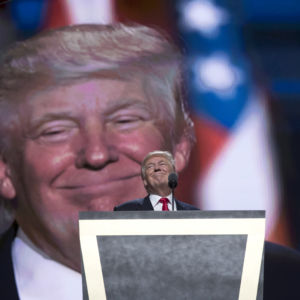Trump-ism isn’t the same without Trump in it.
That’s the lesson the media and political pundits are learning this week after Republican incumbents, who have not fully embraced Donald Trump, won their primaries in landslide victories against “Trump-like” challengers. It seems that the power and influence of Trump doesn’t translate well to other candidates.
Take Marco Rubio for example. He faced a mini-Trump opponent in Carlos Beruff. Beruff has closely associated himself to Trump and even criticized Rubio for not being as tough as the Republican presidential nominee. The Miami New Times called him “the Cuban-American Donald Trump.”
Rubio cruised to victory with about 72 percent of the vote.
Let’s move to Arizona now, where headlines for months read that John McCain was in for “the fight of his political life.”
Enter McCain’s primary challenger: former state Sen. Kelli Ward. She ran hard against immigration and said she was “at the top” of a Trump wave fueled of conservative anger and resentment.
McCain won 51 percent to Ward’s 39 percent.
Trump’s clones in Congressional races are learning that his magical appeal to some voters doesn’t trickle down to them, even if they share the same stances.
“Trump clones in primaries against incumbent Republicans aren’t proving popular to voters. They often look fringe,” said Joseph Bafumi, a professor of government at Dartmouth College.
“He had the existing celebrity status and business success that made him look more legitimate than the mini-Trumps and he motivated people to the polls that just don’t show up for the mini-Trumps.”
This theory was also exhibited in the Wisconsin primary between House Speaker Paul Ryan and Paul Nehlen.
Nehlen campaigned like Beruff and Ward, saying Ryan “betrayed” Trump and cared more about attacking him than helping the American people.
Trump even praised Nehlen before party leaders pushed him to endorse Ryan, albeit unenthusiastically. Sarah Palin and Ann Coulter even stumped for Nehlen.
But it did not seem to have any effect. Ryan won by nearly 70 points.
Interestingly, Rubio, McCain and Ryan have all said they support and endorse Trump, but have not been too eager to campaign with him. They have also criticized him when they think he’s gone too far.
You would think this would hurt these incumbents who don’t necessarily want to associate with Trump, but still need to support their party’s nominee, right?
Maybe not.
Joe Scarborough, co-host of Morning Joe on MSNBC, doesn’t think it hurts them at all.
“Right now, what a lot of people are starting to realize is, there’s no punishment for incumbents…who meekly support him and then run away from him as far as they can,” he said on his Wednesday show. “This seems to be a winning formula.”
Bafumi agreed and said that even though Trump endorsed them too, that hasn’t had a significant impact on them either.
“The people Trump brought to the polls may not be as likely to show up for the Trump clones, which proves advantageous to incumbent Republicans,” he said. “[Trump’s endorsement] may have helped the Republican incumbents some, but it’s likely they would be winning even if he didn’t endorse anyone.”
Now what about Kelly Ayotte in New Hampshire? She’s an incumbent facing a tough re-election against Democrat Gov. Maggie Hassan. But first, she faces a primary on September 13 against Jim Rubens, someone who has not wavered in his support for Trump.
Although not a “bible thumping” Trump supporter, Rubens has defended Trump’s rhetoric on several occasions. He said Trump is “not a racist” when the business mogul criticized an American judge of Mexican heritage. But he has also said he “would not speak like Trump” and doesn’t agree with everything he says.
Ayotte, on the other hand, has gone on a similar route as Rubio, McCain and Ryan. She says she supports Trump, but doesn’t endorse him. This middle-of-the-road response has Democrats and Rubens on the attack, telling her to pick one or the other.
So will her tepid support of Trump and Rubens’ challenge from the right hurt her in the primary?
The polls don’t seem to point that way. Granted, the last poll taken in the Granite State by WMUR that included Rubens was at the end of July. And 62 percent of voters did not know enough about him to give an opinion.
On top of that, the pollsters didn’t even put Rubens and Ayotte in a primary matchup.
Bafumi said Ayotte would easily make it to the general election in November.
“I think she will win convincingly,” he said. “Trump’s strength has not parlayed into an anti-incumbency tendency in the Republican primaries.”

